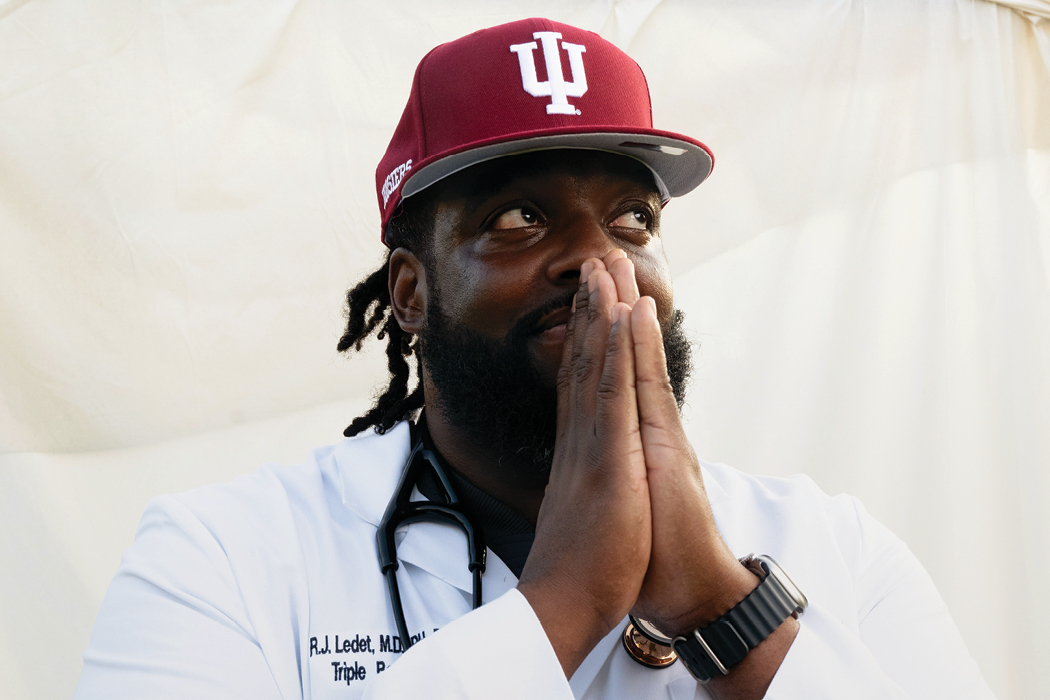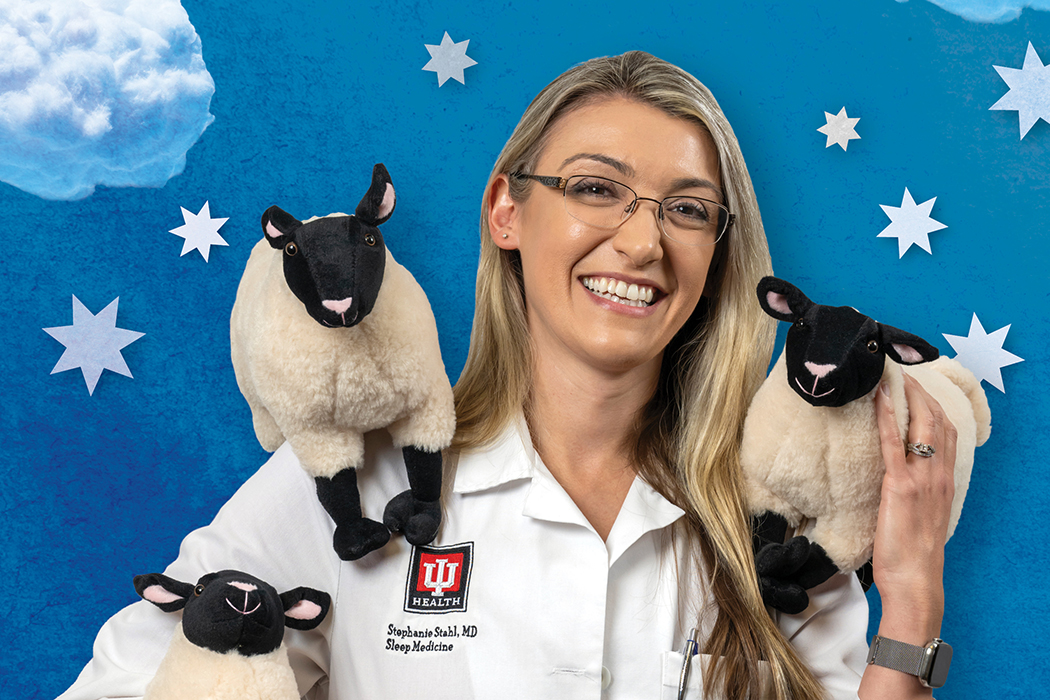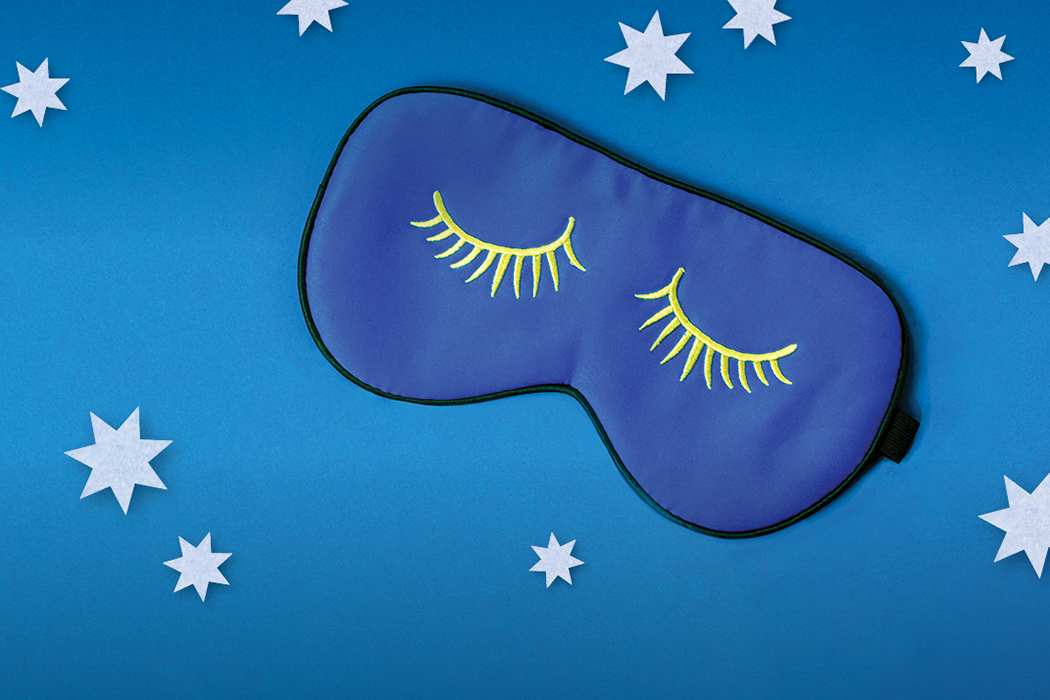Tailoring a New White Coat

Our health is precious to us. And choosing a medical doctor is essential, yet personal. But for many members of minority communities, it can be difficult to find a skilled physician who shares their background and identifies with their challenges.
In the state of Indiana, for instance, there’s only one Black doctor for every 3,200 Black residents, and only one Latine doctor for every 4,600 Latine residents. For perspective, there’s one white doctor available to every 340 white residents. (All figures are approximate.)
As the largest medical school in the country, Indiana University School of Medicine is striving to address these alarming statistics by diversifying medical training and opportunities. One way the school is taking action is by learning from the resident physicians who have matched to IU—like Lake Charles, Louisiana, native Dr. Russell Ledet, who has been spearheading effective change from Louisiana to Indiana and across the United States.

In 2022, IU and Ledet made history. He became the first Black man to match into the School of Medicine’s Triple Board Residency program: a unique opportunity where future physicians become board certified in three disciplines. Ledet’s fields are pediatrics, child psychiatry, and adult psychiatry, focusing on mental health accessibility for marginalized communities.
These areas of study are meaningful to him because they reflect what was absent in his childhood. “During my upbringing, I didn’t have quality health care,” Ledet shared. “I didn’t have mentorship. I didn’t have mental health advocates.” In fact, Ledet couldn’t remember anyone ever asking what was going on in his body, his heart, or his mind.
On that historic “match day” in 2022—the day on which thousands of medical students across the U.S. learn where they will train for their residency—Ledet’s triumphant moment was captured on video. Filled with emotion, he shouted to himself over and over again, “I’m proud of you, Black man!” The moment went viral on social media, was picked up by several news outlets, and ultimately landed Ledet on Good Morning America and The Kelly Clarkson Show.
But if you had told a young Ledet that he’d one day become a doctor and galvanize a generation of aspiring Black physicians, he simply wouldn’t have believed you.
An uphill battle
Growing up in Lake Charles, Ledet and his family had no time to think about health care—survival was their top priority. At home, his mother burned candles for light and used dish soap to clean their pots, their clothes, and their bodies. For dinner, his family searched the dumpsters behind a local Sam’s Club store for thawed pizzas, not-yet-rotten fruit, and loaves of bread.

“I remember climbing into one of the [trash bins] and looking back at my mother and grandmother,” Ledet recalled. “I remember the hope in their eyes that I would find something.”
In school, Ledet was not intellectually pushed, despite being intellectually curious. He didn’t have a library card but would voraciously pluck through the books his mother stacked up at home, reading more than 2,000 before his senior year of high school.
Despite his proximity to the realities of poverty, Ledet’s imagination protected his interests—the primary one being science. Beyond the fun of playing with Erlenmeyer flasks and memorizing the periodic table, Ledet was inspired by what science represents: progress, new possibilities, and endless discovery.
That imagination and passion ultimately paid off. After proudly earning his high school diploma (which U.S. statistics would suggest he only had a 13 percent chance of doing), he enlisted in the Navy and later graduated from college with a dual degree in medicinal chemistry and molecular biology.
While in college, Ledet worked as a security guard at Baton Rouge General hospital—and that’s where his life truly changed. His view of the medical field through the lenses of security cameras inspired a new dream: to become a physician. “I was experiencing things I had never seen before. From the emergency rooms to patient care, I got intrigued by it all.”
A full-circle moment
Ledet went on to pursue his doctorate in molecular oncology and tumor immunology at New York University. But the call of being a physician never ceased; it only intensified. He told his mentors he was uncomfortable knowing the science of a patient’s body but not the personal care of how to treat them in a clinical setting. “I knew I had to go to medical school,” he said.
In 2018, after graduating from NYU, Ledet began his medical training at Tulane University, where he also pursued an MBA. During his med school experience, a full-circle moment took place: Ledet returned to Baton Rouge General Hospital—but this time as a physician in training, working alongside surgeons in the operating room.

“I went back to the same hospital I used to be a security guard for,” Ledet shared. “That moment meant so much to me.”
As he was completing his medical education at Tulane, Ledet began researching places to embark on the next phase of his career: residency. Through that research, he encountered a pivotal post on Instagram: Dr. Maya O. Cloyd shared her acceptance to the Triple Board Program at IU.
Ledet contacted Cloyd for insight and honest feedback, since she was the first Black person he’d seen triple board match. “She was my first glimpse into the program,” said Ledet, “and she spoke highly of it.”
True to Cloyd’s account, Ledet thought highly of the faculty, students, and authentic environment he encountered when he interviewed at IU. “I was impressed by how the director valued my mind,” he shared. Ledet also perceived a sincere interest in his ideas, rather than a tokenizing of his race.
The rest, as they say, is history. Ledet matched with IU in 2022 and determined that the right place to further his training would be over 800 miles from home, in the heart of Indiana. “I was so happy for him when he placed,” said Cloyd. “Russell’s tenacity will enrich the program, and the program will be better for it.”
Freedom leads to focus
Now more than a year into his residency, Ledet is continuing to thrive. “I don’t have to change some component of who I am to be here,” he shared. “No one is judging me for my [dread]locks, my cartoon scrubs, or the way I talk.”

As the medical field strives to make progress in the area of diversity, equity, and belonging, Ledet stressed why inclusion is so crucial for doctors—and ultimately, their patients. “When you are your authentic self, there’s nothing on your mind taking you away from being creative, innovative, and focused on discovery. I want to become the best physician I can be for everyone, and part of that is being free.”
Ledet used to view his life as a journey through a dense forest, full of unlikely opportunities and unfortunate events. Now, he recognizes that his hardships and triumphs are purposed: first, to equip him to care for community members like those he knew growing up; and second, to inspire the next generation of physicians of color.
For Ledet, the triple board program at IU—and his career as a physician—are not about a title or a job.
“I’m becoming what I needed as a child. This is my calling. This is personal.”
You can join IU School of Medicine in attracting and retaining talented, compassionate students like Ledet. Make a gift to the Diversity Recruitment Scholarship fund, or contact Caitie Deranek Stewart, senior associate director of development at IU School of Medicine, at 317-278-2133 or cderanek@iu.edu.
This article was originally published in the 2023 issue of Imagine magazine. Thank you to Laura Gates and the Office of Strategic Communications at IU School of Medicine for original reporting that contributed to this story.
Tags from the story
Written By
Brittany King
Brittany Talissa King is a graduate of IU (BA'14), New York University (MA'19), and a writer for the IU Foundation.



